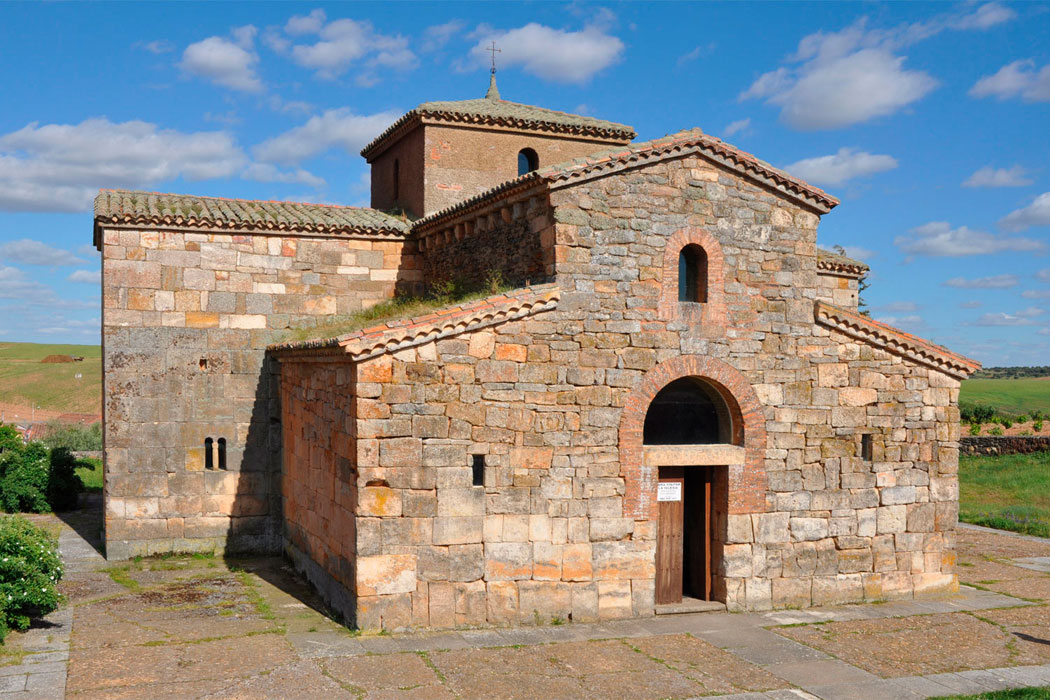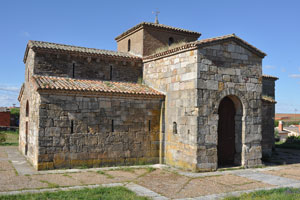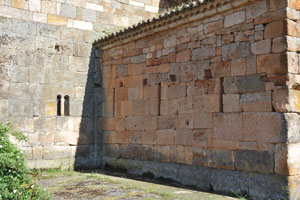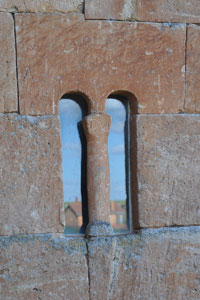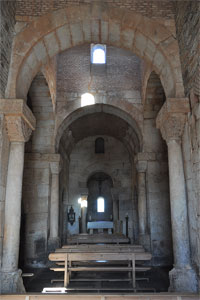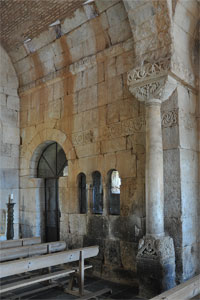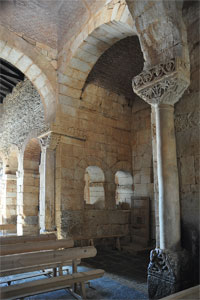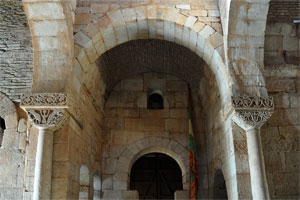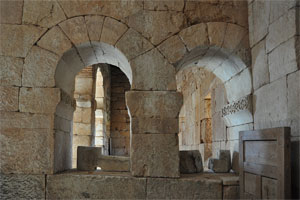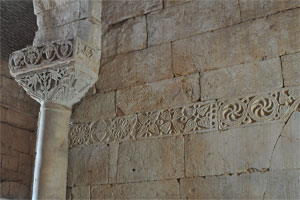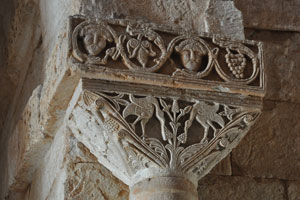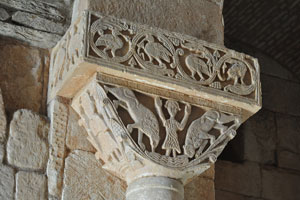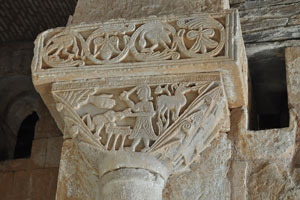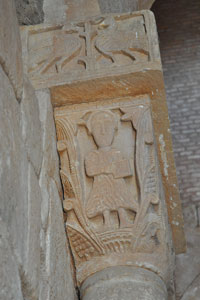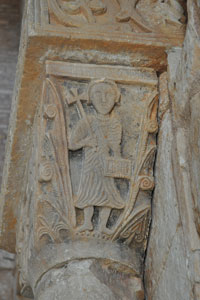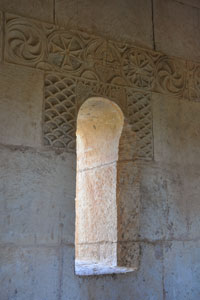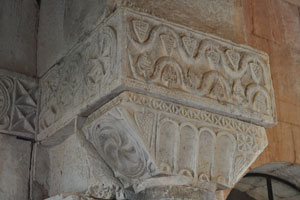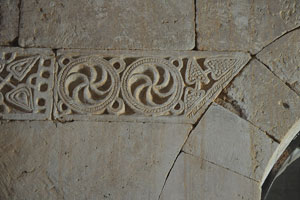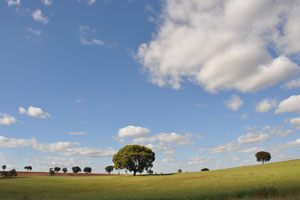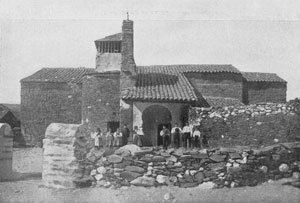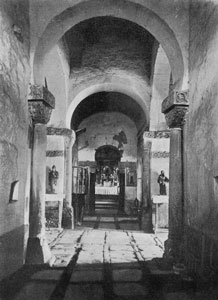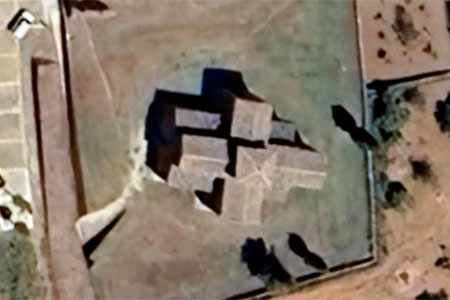Monastery of San Pedro de la Nave
San Pedro del Esla / San Pedro de Tunis
(San Pedro de la Nave-Almendra, Zamora)
The monastery of San Pedro de la Nave, known in medieval times as San Pedro del Esla, is mentioned in a document that has survived through later copies, which deals with a donation made in the year 907 by King Alfonso III to this house, where its abbot, Servodeo, is mentioned. This abbot appears again in a new donation in the year 922. It has been considered that the monastery was founded at the time of the repopulation of the territory, around the year 900.
At an undetermined date, this monastery became dependent on San Salvador de Celanova (Ourense) as a priory, and it is known that during the 10th century, that Galician monastery acquired some possessions in this territory. The first record of the priory of San Pedro de la Nave, dependent on Celanova, is not found until 1222, at the end of the 15th century it became dependent on San Benito de Valladolid. The place name Nave probably has to do with the boat crossing that was near the church, on the river Esla, to which the priory had its rights, until its disentailment.
More than for its monastic status, this place is famous for its well-known pre-Romanesque church. It is difficult to establish the period of its construction, which has been placed in the Visigoth period (at the end of the 7th century), it would have had some reconstructions and was modified around the 10th century by Mozarabs, after the recovery of the territory. In any case, both its history and the construction process are the subject of differing opinions.
The study has the added difficulty that the building is not preserved in its original location, as it was moved between 1931 and 1932 due to the construction of the Ricobayo reservoir on the Esla River. That operation was entrusted to the architect Alejandro Ferrant, under the direction of Manuel Gómez Moreno who, in 1903, had made the church known and valued, which until then had gone practically unnoticed, although not unknown.
- CABALLERO, Luis (1997). La iglesia de San Pedro de la Nave (Zamora). Arqueología y arquitectura. Archivo español de arqueología. Vol. 70. Nº 175-176
- CABALLERO, Luis; coord. (2004). La iglesia de San Pedro de la Nave (Zamora). Diputación de Zamora
- CABALLERO, Luis; i altres (1997). San Pedro de la Nave (Zamora). Excavación arqueológica en el solar primitivo de la iglesia y análisis por dendrocronología y carbono-14 de su viga. Anuario del Instituto de Estudios Zamoranos, núm. 14
- GÓMEZ-MORENO, Manuel (1903). Catálogo Monumental de España: Provincia de Zamora
- GONZÁLEZ BALASCH, María Teresa (1989). San Pedro de la Nave, Priorato de Celanova, según un manuscrito dle siglo XVII. Primer congreso de historia de Zamora
- GONZÁLEZ RODRÍGUEZ, Rafael (2020). El privilegio de Alfonso III a San Pedro de la Nave del año 907. Más Vale Volando
- HOPPE, Jean-Marie (2004). Ensayo sobre la escultura de San Pedro de La Nave. La iglesia de San Pedro de la Nave (Zamora). Diputación de Zamora
- HOYOS, Julio (1917). Templos visigodos de España. San Pedro de la Nave. La Esfera, núm. 194
- ILLANA, Laura; i altres (2008). La iglesia visigótica de San Pedro de la Nave. Zamora
- LLIDÓ MIRAVÉ, Javier (2019). El papel de la epigrafía en la datación de San Pedro de la Nave. Boletín del Archivo Epigráfico, núm. 4
- LORENZO ARRIBAS, Josemi (2003). San Pedro de la Nave (Zamora). Interpretaciones eruditas y populares sobre el origen de un templo y sus leyendas. Culturas Populares, núm. 3
